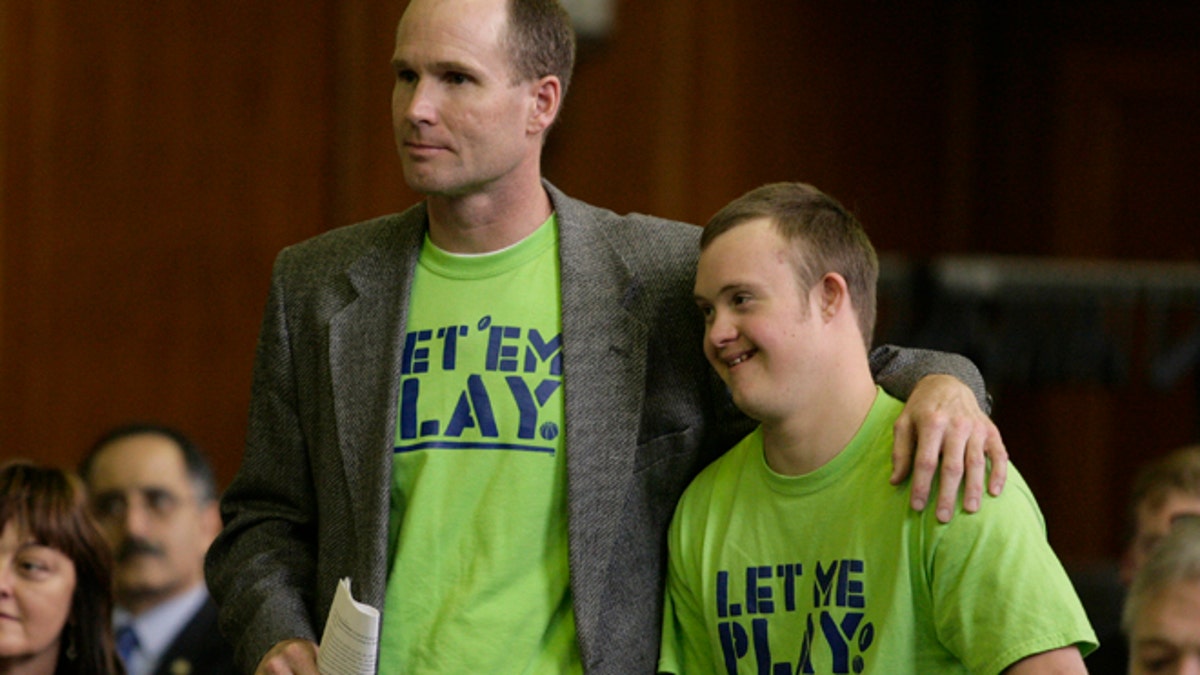
May 2, 2012: Dean Dompierre, left, and his son, Eric Dompierre, are introduced before they testify at a state Senate committee hearing in Lansing, Mich. Dompierre is supporting an age-limit waiver that would allow his son with Down syndrome to play sports next season. (AP)
LANSING, Mich. – A 19-year-old with Down syndrome took his case for high school sports eligibility to state lawmakers Wednesday, arguing that Michigan should join a growing number of states that consider age-limit exemptions for student athletes whose playing careers are delayed because of disabilities.
Under the current regulations, Eric Dompierre can't play high school football or basketball as a senior next school year because he had turned 19 prior to Sept. 1. However, he is asking the Michigan High School Athletic Association for a waiver because his disability caused him to twice be held back early in his school career.
When a senator asked whether he'd rather be there testifying or out on the playing field, Dompierre's response was immediate: "Be playing."
Dompierre, who attends Ishpeming High School in Michigan's Upper Peninsula, testified in front of the Senate Education Committee Wednesday alongside his father, Dean.
Dean Dompierre said 23 other states allow waivers for students with disabilities. Eight states specifically provide for an age-eligibility waiver for students with disabilities, while 15 additional states allow for waivers from any rule if undue hardship to the student would occur. Athletic association officials confirmed the statistics.
"Something has to be done," the elder Dompierre said. "A solution is already out there."
Association officials did not attend the hearing, but Executive Director John Roberts sent a letter this week to committee Chairman Phil Pavlov that points out Michigan is in the majority of states that don't allow exceptions to the maximum age. Even some states that do allow waivers have never granted one, Pavlov wrote.
For three decades, the MHSAA's bylaws have said rules can only be changed by a two-thirds vote of the superintendent and principals of the association's member schools. The letter said numerous meetings were held last year across the state to discuss the age-waiver proposal.
"We are aware of the responsibility to balance the needs of an increasingly diverse student population where the diagnoses of disabilities are exploding as the definitions of disabilities are expanding," Roberts wrote. "We believe these trends explain why local school administrators have continued to request a bright line with respect to the maximum age rule."
Starting in 2010, Ishpeming High School sent three letters to the athletic association proposing a rule change. The association's Representative Council is reviewing Ishpeming's latest proposal this month, the letter said, and the association would keep the Senate committee informed.
"Michigan's kids with disabilities should not have to beg their leaders for relief," Dompierre said, adding the association should amend its rule "not because they have to, but because it's the right thing to do."
Some lawmakers are pushing for change in time for Dompierre's senior year. Escanaba Republican Sen. Tom Casperson, who introduced a resolution urging the association to adopt the waiver, said he does not believe letting the student play would affect the integrity of the rule by affecting a game's outcome or the safety of other players.
Still, Casperson knows Eric Dompierre's purpose on his school's teams isn't to warm a bench. The senator kicked off the testimony by showing video footage of Dompierre hitting a 3-point jump shot in a playoff game against rival Negaunee, eliciting cheers from fans in both stands.
"He is a part of that team," Casperson said.
After the hearing, Eric Dompierre said he had worked too hard to lose his last chance be part of his school's teams.
"I want to play with my teammates, and they want to play with me," he said.
